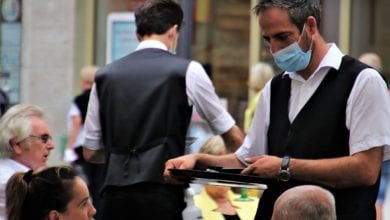How can hospitality recover from the Covid crisis?

Covid-19 is a crisis unlike any other people have faced in living memory. Aside from the very real human cost, the economic impact has been devastating, with hospitality among the sectors most severely affected by the pandemic.
Marble Arch BID is home to more than 100 restaurants, cafés, bars and hotels and our continued engagement with BID members has given us a unique perspective of the crisis and the challenges the industry is currently facing.
Given the profound uncertainty looming over establishments of this kind, many of whom are fighting for their very survival, recovery seems a distant prospect at this moment in time. As evidence mounts that we have passed the peak of the virus, now is the time for businesses to prioritise recovery planning, looking ahead to when activity can resume.
Without being alarmist, the sector faces a real uphill battle when the lockdown comes to an end. The UK hospitality sector employs over 3.2 million people, which is 11% of UK jobs, making it the third largest sector in the UK, accounting for £130 billion in revenue, 6 per cent of all businesses and 5% of GDP, and so the need for a robust and co-ordinated recovery plan becomes all the more pressing
While a lockdown would have been previously considered unimaginable just a few months ago, it has become part of our DNA in just a matter of weeks. For something that is now so ingrained in our daily lives, this is bound to leave a lasting imprint on the national psyche. For many, there will be major reluctance to return to densely packed spaces after many months of social distancing. The focus now will need to be on regaining consumer confidence as an absolute priority if hospitality is to bounce back from this.
Simply put, humans are programmed for survival. While we all enjoy a nice meal in a restaurant, this becomes problematic when we perceive a potential threat against us and our families. It will require all of our collective ingenuity to overcome this barrier and help put consumers’ minds at ease, but this is where it’s incumbent on us to share ideas, knowledge and best practice as activity begins to ramp up in phases.
This is particularly true as, at the time of writing, there is no precise template for how the Government will ease lockdown restrictions. However, it is highly likely that the gradual easing of measures to prevent the spread of COVID-19 will have an unexpected impact across all businesses in the hospitality sector. For example, restaurants will need to consider how they can ‘de-densify’ their premises in line with social distancing guidelines. Consequently, restaurants will be able to accommodate a lower number of covers, impacting on overall profitability.
The BID can help businesses overcome this lack of guidance and regain profitability by bringing together learning from different sectors. This can foster an exchange of ideas, encouraging members to adopt a more holistic approach to recovery planning that incorporates insights and high-level thinking from across the wider business community.
This enables everyone to share and test consumer confidence and behaviour and learn from each other as the lockdown is eased in phases. We have supermarkets, pharmacies and hotels open at the moment in Marble Arch, so their experience will help guide the responses of offices, restaurants, venues, pubs and shops as these also start to re-open.
The BID can also support the hospitality sector in lobbying for guidance and change that will be really impactful to their businesses. For example, a temporary easing of licencing restrictions, while not necessarily always popular with some, could prove decisive in the survival of many businesses, helping to offset the drop in capacity.
Another major issue for the sector is the likely drop in international tourist numbers. According to the revised 2020 tourism forecast from Visit Britain, it’s estimated that inbound tourism will take some months to return to more normal levels, although domestic tourism is expected to re-bound much sooner.
For an area like Marble Arch, which thrives on income from international tourism, we must now explore ways to capture domestic tourism spend in the interim. Closer collaboration with tourism trade organisations and our neighbouring retail district will form a key strand of efforts to elevate and enhance the profile of our local area to support our recovery.
Hospitality must also consider how it can tackle the issue of recruitment when activity resumes. According to Tim Seyner Harness, Founder and Director of recruitment agency Artisan People, existing traditional talent pools have been decreasing for the past few years and this has been accelerated by COVID-19. The industry will need to expand beyond the traditional candidate pool. This will mean recruiting candidates from previously untapped backgrounds, creating opportunities for non-traditional candidates, bringing fresh blood and ideas into the industry.
We support UK Hospitality’s recent comments on the need for government intervention to protect businesses from rent liabilities. The introduction of lockdown measures has dealt a huge blow to the sector leaving it with a severe liquidity problem, putting jobs and businesses at risk. Without a collective voice, influencing public policy in favour of hospitality businesses becomes problematic therefore, hospitality businesses need to mobilise and engage with organisations like BIDs that can represent them and their interests.
As part of the #RaiseTheBar campaign, we joined a coalition of industry leaders, political figures, and BIDs, and lobbied for Central Government to expand the rateable value threshold for cash grants for all hospitality, leisure and retail businesses from £51,000 to £150,000.
In raising the threshold, over 13,000 additional businesses in London alone would gain access to the £25,000 grant in order to survive. Our collective ability to make our voices heard will profoundly shape the future of the hospitality industry and could mean the difference between survival and extinction for the businesses and jobs that are at risk.
On the issue of government support, Barnaby Meredith, managing director of The Meredith Pub Group, which owns the Portman Pub in Marylebone, said: “There is no quick fix to all of this. Our business model relies on us getting customers in the door and it’s likely to be some time before we can do this.
The current business rates system is unfair on leaseholders for a variety of reasons and places a disproportionate burden on London businesses. Raising the rateable threshold for additional funding to £150,000 will give our industry a boost at a time when it needs it most. Pubs thrive on momentum and I just don’t think there is much of an appetite for leaseholders to take on debt during this period of heightened uncertainty. Pubs will need to invest in order to adapt to this new landscape, and Government grants can help to support this.”
What is apparent is that greater collaboration and communication between hospitality businesses will play a vital role in the recovery process as we learn from each other and pull together as a district.
Organisations like BIDs can help facilitate a better exchange of ideas and intelligence to inform future planning, providing a collective voice to promote and protect the interests of businesses, through advocacy, marketing and other activity to influence key stakeholders, while keeping them informed of the latest industry-wide issues and best practice. In the face of much uncertainty, the sector is stronger when it works together.
By Kay Buxton, chief executive of Marble Arch London BID












